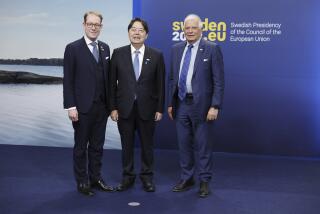A Share in Keeping the Peace : With new U.N. role, Japan will shift to higher level of global responsibility
- Share via
Stung by the international criticism of its failure to contribute military forces to the coalition that liberated Kuwait in 1991, Japan is preparing to adopt legislation that for the first time would allow it to take part in U.N. peacekeeping missions.
This historic departure seems to have a fair degree of support in a nation where pacifism has sunk deep roots since the end of World War II. At the same time, some of Japan’s closest neighbors, especially Korea and China, which suffered grievously from the atrocities and despoliation of Japanese militarism, are not hiding their concerns over this new turn.
Japan’s postwar constitution, dictated by U.S. occupation authorities, renounces war as well as “the threat or use of force” to settle international disputes, and says that land, sea and air forces “will never be maintained.” Security realities long ago caused Japan to bypass this promise by creating a three-service Self-Defense Force for protection of the home islands.
Under legislation nearing final approval in the lower house of the Diet, Japan could contribute up to 2,000 lightly armed troops to U.N. operations involving such tasks as refugee relief, medical services, transportation and construction. Riskier duty--monitoring a cease-fire, for example--would require a separate vote of the Diet. Participation in any shooting war remains taboo. Cambodia is expected to receive the first contribution of Japanese forces, perhaps within a few months.
With this legislative action, which has won Washington’s endorsement, the world’s second-richest nation is moving to a new level of global responsibility. The fears in Asia that the change could portend a revival of Japanese militarism may be groundless, but the devastating historical experiences that prompt those fears remain seared into national memories. The Japanese themselves, who suffered greatly from the aggressiveness of their leaders in the 1930 and ‘40s, share those memories. That provides probably the strongest assurance that there will be no revival of anything that even hints at militarism.
More to Read
Sign up for Essential California
The most important California stories and recommendations in your inbox every morning.
You may occasionally receive promotional content from the Los Angeles Times.









